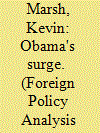|
|
|
Sort Order |
|
|
|
Items / Page
|
|
|
|
|
|
|
| Srl | Item |
| 1 |
ID:
159580


|
|
|
|
|
| Summary/Abstract |
This study revisits Carter and Scott’s model of congressional foreign policy entrepreneurship (2004, 2009, 2010) to evaluate how a new generation of legislative innovators, including Senators Rand Paul and Ted Cruz, may influence US foreign policy. Specifically, this study proposes two new types of foreign policy entrepreneurs in Congress—“revolutionaries” and “mercenaries”—and examines their different motivations, policy objectives, and strategies to attempt to influence or change state behavior. Case evidence suggests that in a new era of partisanship and polarization, more complex models of players, strategies, and measures of success are needed.
|
|
|
|
|
|
|
|
|
|
|
|
|
|
|
|
| 2 |
ID:
134682


|
|
|
|
|
| Summary/Abstract |
This article reviews power transition theory and emerging threats to U.S. national security. It then analyzes how the 2014 QDR will ensure U.S. relative power decline and how the strategy fails to effectively counter the rise of China and Russia as challenger states in the international system. Finally, several policy options are proposed to address the deficiencies of the QDR and to counter an increasingly aggressive China and revisionist Russia.
|
|
|
|
|
|
|
|
|
|
|
|
|
|
|
|
| 3 |
ID:
140563


|
|
|
|
|
| Summary/Abstract |
AirSea Battle (ASB) has generated significant publicity, controversy, and debate among scholars, analysts, commentators, and observers of US defense strategy. However, a research gap exists concerning formal analysis of the impact of the operational concept on the relationship between the US Air Force (USAF) and the US Navy (USN). The impact of the ASB operational concept on the USAF–USN relationship is examined across the issue areas of strategy, budgets, weapons procurement, and training. These four issue areas represent important areas of historical conflict and competition between the Air Force and Navy. The conclusion is that ASB is ushering in a new era of Air Force–Navy partnership that advances the inter-service dynamic from “jointness” toward integration. The emergent USAF–USN partnership therefore represents a significant development in US defense politics and defense strategy.
|
|
|
|
|
|
|
|
|
|
|
|
|
|
|
|
| 4 |
ID:
131362


|
|
|
|
|
| Publication |
2014.
|
| Summary/Abstract |
In March 2011, President Barack Obama ordered US air and naval forces to commence Operation Odyssey Dawn in Libya to impose a no-fly zone. The decision by the Obama Administration to intervene in a limited and supporting role in Libya is an important development in US foreign policy. Operation Odyssey Dawn presents scholars with a valuable opportunity to analyze and explore how US foreign policy is made and what roles domestic politics and elite perceptions play in decisions to use force. The author argues that neoclassical realism is a useful and compelling theoretic framework with which to analyze Operation Odyssey Dawn. While the Administration intervened in response to perceived external-level threats to US national interests, salient intervening domestic-level variables and elite perceptions shaped and guided the tenor and scope of the operation.
|
|
|
|
|
|
|
|
|
|
|
|
|
|
|
|
| 5 |
ID:
116296


|
|
|
|
|
| Publication |
2012.
|
| Summary/Abstract |
The Defense Strategic Guidance (DSG), released by the White House in January 2012, was widely acknowledged as the most significant reassessment of America's strategic posture in a decade. Sustaining U.S. Global Leadership: Priorities for 21st Century Defense is not simply a response to systemic-level threats and interests, but reflected principles best articulated by neoclassical realism (NCR). By examining systemic, domestic, and elite influences affecting the United States in 2012, this article demonstrates that the DSG illustrates the core principles of neoclassical realism. The strategy reflected the Obama administration's filtration of systemic-level imperatives through elite perceptions and domestic politics. The DSG is realist because it sought foremost to address systemic challenges, including American relative decline. It is neoclassical realist because the strategy was markedly influenced by elite perceptions and domestic politics, resulting in deliberate gambles. Neorealism continues to have great value explaining systemic trends, but it cannot explain the specific foreign policies of individual states. NCR provides a way to retain the most effective analytical features of neorealism while incorporating the influence of domestic politics and elite perceptions on state policy-making. Neoclassical realism is a promising theoretical framework for foreign policy analysis, but further testing and refining is needed to ensure that it retains its descriptive accuracy and predictive capability.
|
|
|
|
|
|
|
|
|
|
|
|
|
|
|
|
| 6 |
ID:
133587


|
|
|
|
|
| Publication |
2014.
|
| Summary/Abstract |
This study examines the decision-making process leading to President Barack Obama's decision to order a troop surge in Afghanistan in December 2009. I analyze the decision-making process according to the precepts of the bureaucratic politics model and conclude that the bureaucratic politics model provides a compelling and descriptively accurate account of the Afghanistan surge decision-making process. Actors' policy preferences were influenced by consideration of bureaucratic role and position within government, significant examples of political activity occurred throughout the strategy review, and the ultimate decision was a political compromise.
|
|
|
|
|
|
|
|
|
|
|
|
|
|
|
|
|
|
|
|
|